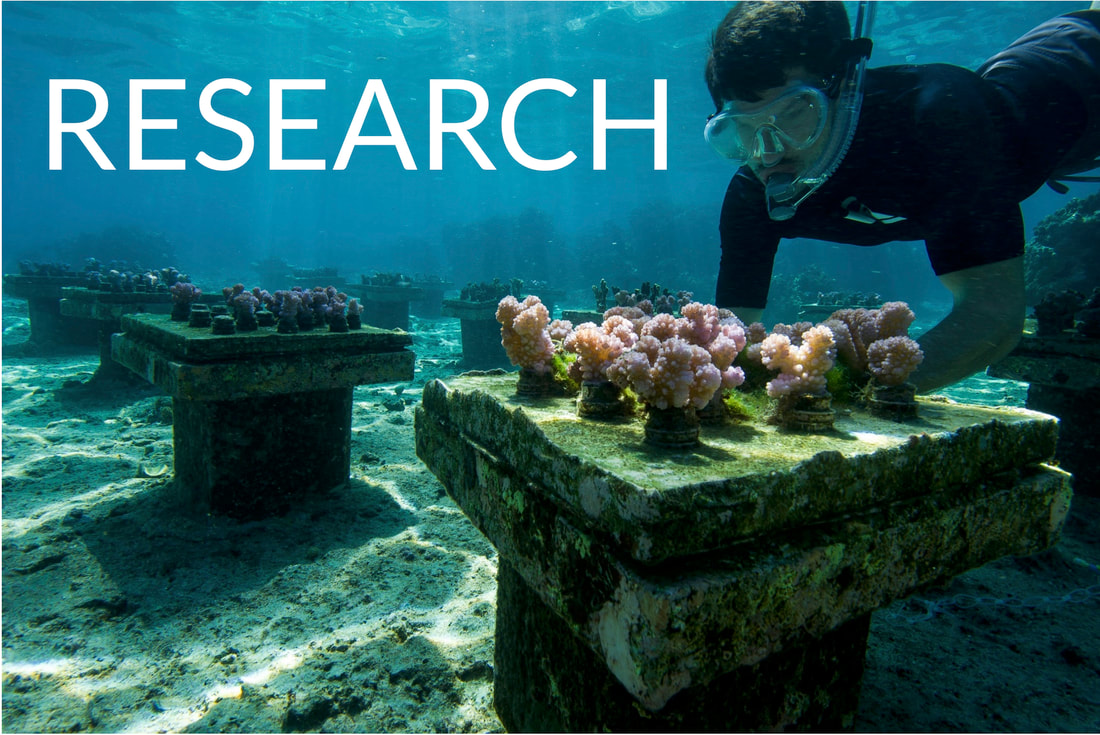As an experimental marine ecologist, I am broadly interested in questions at the intersection between fundamental and applied ecology that can help stakeholders better understand, predict, and manage ecosystems in a changing ocean. My research to date has encompassed a variety of ecological processes and experimental approaches ranging from the macro-community level down to microbial scales, with a focus on uncovering how human protection and exploitation are reshaping common biotic interactions in threatened coastal ecosystems. My current research efforts revolve around the following themes:
Biodiversity and ecosystem function on tropical reefs
I am interested in the functional role of biodiversity in coral reef ecosystems, including the mechanisms that mediate biodiversity effects across spatial and temporal scales. Currently, we are running long-term experiments to assess whether (1) greater coral species and genotypic diversity enhances coral community performance, as well as potential processes driving these effects (e.g. differential susceptibility to disease, predation, competition, etc.), and (2) whether greater diversity of macroalgal competitors further suppresses corals and enhances macroalgal performance. All experiments are being carried out in coordination with the NSF’s Moorea Coral Reef Long-term Ecological Research (MCR LTER) site.
Fishing and the 'seascape of fear'
I am investigating how fear of human predators impacts reef fishes. Predators often have cascading impacts beyond just killing their prey – instilling fear that changes prey behavior and physiology, and can impact ecosystems in ways that exceed predation itself. Identifying and quantifying fear effects will be key to predicting how ecosystems might respond to global change and to a wide array of anthropogenic stressors. Humans are now the dominant predator across many ecosystems, and increasing evidence suggests that we too can generate these phenomena. My current efforts focus on how fear of humans affects the behavior, stress levels, and reproductive potential of coral reef fishes.
Sea cucumbers and the microbial ecology of coral reefs
I am currently leading experiments in French Polynesia focused on the functional role of sea cucumbers in tropical reef ecosystems. Specifically, we are investigating how sea cucumber presence or absence impacts sediment- and coral-associated microbial communities and the potential implications for coral health and persistence. Ecologists have long recognized the dramatic impacts on natural communities that can occur following the removal of top consumers, but the effects of removing lower trophic levels remain inadequately understood. Sea cucumbers are thought to play critical roles in benthic marine communities, but these once abundant detritivores are exceedingly rare due to centuries of exploitation. Findings from our recent field experiments in Mo’orea indicate that (1) coral extracts better suppress a common coral pathogen (Vibrio coralliilyticus) when sea cucumbers are present and (2) corals without co-occurring sea cucumbers suffer greater mortality due to an apparent sediment-associated pathogen. We are actively investigating the dynamics of sediment and coral microbiomes from these experiments in hopes of identifying the pathogen(s) involved, as well as specific mechanisms (e.g. coral-associated chemical defenses) that may contribute to pathogen suppression.
Biodiversity and ecosystem function on tropical reefs
I am interested in the functional role of biodiversity in coral reef ecosystems, including the mechanisms that mediate biodiversity effects across spatial and temporal scales. Currently, we are running long-term experiments to assess whether (1) greater coral species and genotypic diversity enhances coral community performance, as well as potential processes driving these effects (e.g. differential susceptibility to disease, predation, competition, etc.), and (2) whether greater diversity of macroalgal competitors further suppresses corals and enhances macroalgal performance. All experiments are being carried out in coordination with the NSF’s Moorea Coral Reef Long-term Ecological Research (MCR LTER) site.
Fishing and the 'seascape of fear'
I am investigating how fear of human predators impacts reef fishes. Predators often have cascading impacts beyond just killing their prey – instilling fear that changes prey behavior and physiology, and can impact ecosystems in ways that exceed predation itself. Identifying and quantifying fear effects will be key to predicting how ecosystems might respond to global change and to a wide array of anthropogenic stressors. Humans are now the dominant predator across many ecosystems, and increasing evidence suggests that we too can generate these phenomena. My current efforts focus on how fear of humans affects the behavior, stress levels, and reproductive potential of coral reef fishes.
Sea cucumbers and the microbial ecology of coral reefs
I am currently leading experiments in French Polynesia focused on the functional role of sea cucumbers in tropical reef ecosystems. Specifically, we are investigating how sea cucumber presence or absence impacts sediment- and coral-associated microbial communities and the potential implications for coral health and persistence. Ecologists have long recognized the dramatic impacts on natural communities that can occur following the removal of top consumers, but the effects of removing lower trophic levels remain inadequately understood. Sea cucumbers are thought to play critical roles in benthic marine communities, but these once abundant detritivores are exceedingly rare due to centuries of exploitation. Findings from our recent field experiments in Mo’orea indicate that (1) coral extracts better suppress a common coral pathogen (Vibrio coralliilyticus) when sea cucumbers are present and (2) corals without co-occurring sea cucumbers suffer greater mortality due to an apparent sediment-associated pathogen. We are actively investigating the dynamics of sediment and coral microbiomes from these experiments in hopes of identifying the pathogen(s) involved, as well as specific mechanisms (e.g. coral-associated chemical defenses) that may contribute to pathogen suppression.
